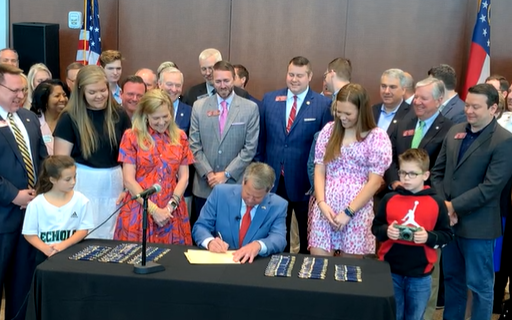Georgia Gov. Brian Kemp, joined by wife, Marty, along with State School Superintendent Richard Woods, parents, students and education leaders signed a series of bills covering a wide range of education topics during an April 28 ceremony at the Forsyth County Arts and Learning Center.
Among the seven bills Kemp signed was HB385. It will allow retired teachers to return to the classroom fulltime while continuing to collect their retirement benefits.
Certain criteria must be met, including the teacher must have served 30 years in a fulltime capacity, be out of the classroom for one year and is certified to teach Pre-K through grade 12.
The teacher must also be certified in an instructional area of highest need passed on the determination of the Regional Education Service Agency. Richmond and Columbia Counties are two of the 12 counties in the Central Savannah RESA.
During his April 27 visit to Deer Creek Elementary School, State School Superintendent Richard Woods said it is a way to address staffing shortages.
MORE: Georgia governor signs seven bills covering education
“One of the things we’ll look at, especially coming out of the pandemic, where we’ve had a struggle, we’ve had a lot of teachers leave the field. But I think there are a lot of teachers that would have loved to stay in there. And they can come back at 100% of pay. It is a way in which we can perhaps bolster our ranks, especially in critical needs area,” he said.
Kemp also signed SB220. It creates the Commission on Civics Education. Part one of SB220 focuses on teaching students financial literacy.
Beginning in the 2024-2025 school year, students will be required to complete a financial literacy course in the 11th or 12th grade as a condition of graduation.
By January 1, 2023, the Professional Standards Commission must establish procedures to ensure teachers have a renewal certificate in business, economics, mathematics, family and consumer science or marketing.
“I think that if we can, you know, provide our kids with a good foundation with that (financial literacy), then what that means is that they’re going to be stable later on, and being stable later on, especially as parents, that means that there’s going to be less friction at the house,” Woods said. “And I guarantee what happens at home doesn’t stay at home. It comes to us each and every day. And if this allows our kids to step into our schools have one less thing to think about than that mean academically, we’re going to be in a better place.”
Section two of SB220 is titled “The Georgia Civics Renewal Act.” It tasks the Commission on Civics Education with educating students on the importance of civic involvement in government or public service.
MORE: State school superintendent visits Richmond County’s top teacher
The language says the 17-member commission shall:
“…periodically review the conditions, needs, issues and problems related to civics education in Georgia schools, including, but not limited to, career, technical, and agricultural education (CTAE) instruction for the government and public administration and the law, public safety, corrections, and security pathways…”
The commission is expected to provide an annual report to the General Assembly recommending action or legislation the commission “deems necessary or appropriate. “
Among the offices and agencies that will appoint the members of the commission are the governor, Georgia House and Senate, the state school superintendent, the Georgia Chamber of Commerce and the Georgia Municipal Association.
Dana Lynn McIntyre is a general assignment reporter for The Augusta Press. Reach her at dana@theaugustapress.com










